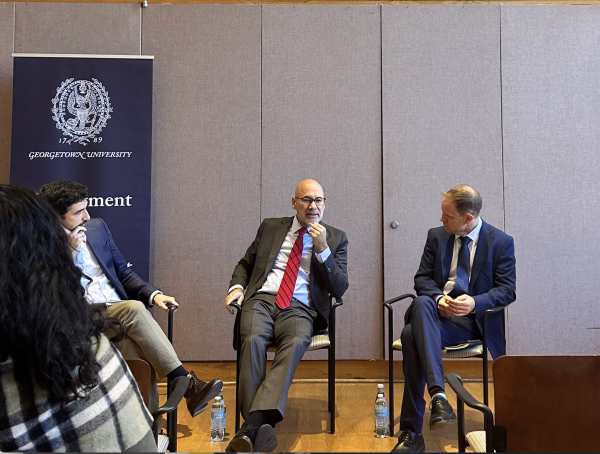The Georgetown University government department hosted the Portuguese ambassador for a panel on how small states’ focus on rule of law can give them power in the changing world order Dec. 3.
Ambassador Francisco Lopes analyzed how small states behave and exert influence, focusing on Portugal, in the panel, titled “Small States in a Changing World Economy.” He spoke with R. Daniel Kelemen, McCourt Chair at the McCourt School of Public Policy, during the event, which was moderated by Tiago Moreira Ramalho, a visiting professor from the Université libre de Bruxelles.
Lopes said countries should orient themselves toward the rule of law, which he said is key to improving domestic and international standing.
“The more a country balances its interests with the rule of law, the more beneficial it is for itself,” Lopes said during the event. “It brings added value in predictability, stability and goodwill. Portugal has been balancing its interests with the international rule of law as best as we can for the last 50 years.”
Portugal has been a modern republic since 1974, when pro-democracy activists overthrew a dictatorship, and it joined the European Union, a political and economic partnership of 27 European countries, in 1986. It has established strong relations within Europe and with countries on other continents as part of its effort to claim some global influence, according to Lopes.

Lopes said policy stability is most important for small nations, since larger countries are better suited to weather political changes in foreign policy.
“We have a base of stable, strategic bets: qualifications, sustainability, energy transition, digitalization and innovation,” Lopes said. “We had stability in the most strategic policy events in foreign policy, and this happened regardless of the political color of the government.”
Kelemen said Portugal is unique in its stability and uniformity of policies and support structures across the country.
“When I think about the Portuguese economic model, it’s striking how much that rule of law and stability has made the Portuguese economic model deeply impressive,” Kelemen said during the event. “Every town you go to has a beautiful library and a beautiful sports facility, the kind of social support and general quality of life you saw, the absence of homelessness — it’s a very successful country.”
Lopes said Portugal asserts itself despite its smaller size by acting as a bridge in the Atlantic world, adding that the nation’s growth depends on its use of its unique position among European countries in proximity to North America, South America and Africa.
“In terms of connectivity, for example, Portugal is very central to Europe and we have more direct flights from the U.S.,” Lopes said. “We have more and more cables connecting Europe with other continents via Portugal from the U.S., from South America, from Africa. This centrality is paired with an increase of knowledge of Portugal in the U.S., so there’s a really good connection there.”
“Portugal has probably been underperforming, yes, but this transformation has already been happening,” Lopes added. “It has to do with how long it takes for these stable, strategic bets to bring this change.”
Bella Villarin (CAS ’28), who attended the event, said she appreciated how Lopes framed Portugal’s growth and development and was glad to learn about contrasting views of Portugal as a small state or a key global power.
“It was interesting to hear how Ambassador Lopes highlighted the two different lenses you could view Portugal: through a European lens and a global lens,” Villarin wrote to The Hoya. “This dichotomy between periphery and centrality was an idea I had never explored before.”
Lopes said Portugal’s consistent commitment to international rule of law has given it significant influence in European Union multilateral institutions.
“Our main principles and the main orientations were very stable, and this helped a lot our position in the European Union, and is also why we have been seeing some Portuguese get jobs of special responsibility inside the European Union institutions,” Lopes said. “When we negotiate inside the European Union, we are of course defending our interests, but we are always trying to present our positions in a way that is suitable to others.”
“We have been roughly in the group of countries that is always supporting the main priorities of the European Commission when it tries to be the interpreter of the common good,” Lopes added.








